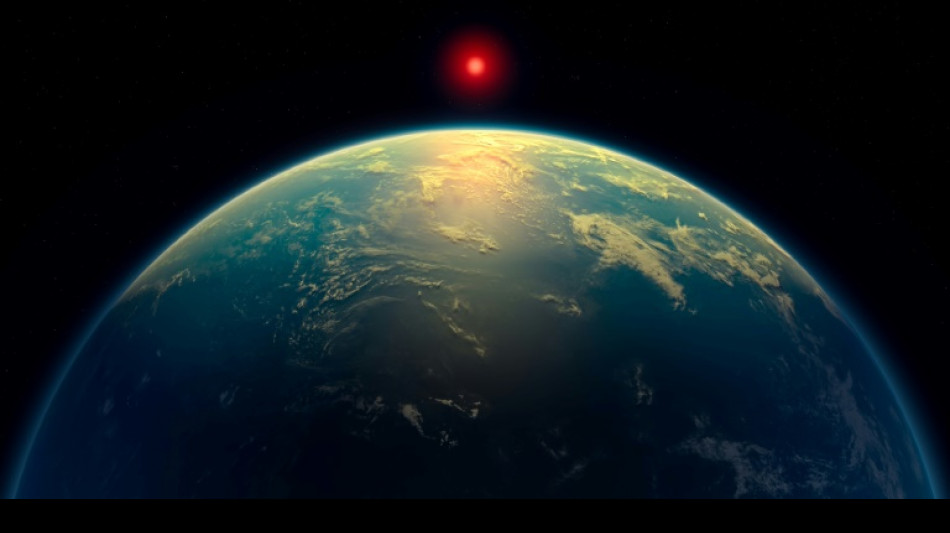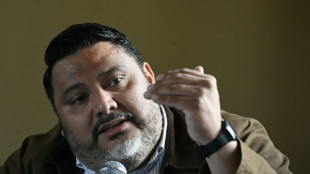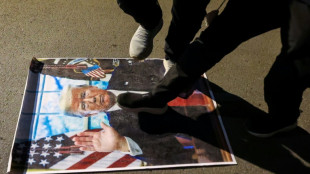
-
 Morocco part company with coach Regragui as World Cup looms
Morocco part company with coach Regragui as World Cup looms
-
Lens beat Lyon on penalties to reach French Cup semis

-
 El Salvador's Bukele holding dozens of political prisoners: rights group
El Salvador's Bukele holding dozens of political prisoners: rights group
-
With Iran war, US goes it alone like never before

-
 Spurs slip deeper into relegation trouble after loss to Palace
Spurs slip deeper into relegation trouble after loss to Palace
-
European, US stocks back in sell-off mode as oil prices surge

-
 Pete Hegseth: Trump's Iran war attack dog
Pete Hegseth: Trump's Iran war attack dog
-
Celtics' Tatum could make injury return on Friday

-
 'Enemy at home': Iranian authorities tighten grip as war rages
'Enemy at home': Iranian authorities tighten grip as war rages
-
Bethell set for 'hell of a career', says England captain Brook

-
 France coach Galthie slams Scotland for 'smallest changing room in the world'
France coach Galthie slams Scotland for 'smallest changing room in the world'
-
Medvedev arrives in Indian Wells after being stranded in Dubai

-
 Trump fires homeland security chief Kristi Noem
Trump fires homeland security chief Kristi Noem
-
Mideast war risks pulling more in as conflict boils over

-
 Wales' James Botham 'sledged' by grandfather Ian Botham after Six Nations error
Wales' James Botham 'sledged' by grandfather Ian Botham after Six Nations error
-
India hero Samson eyes 'one more' big knock in T20 World Cup final

-
 Britney Spears detained on suspicion of driving while intoxicated
Britney Spears detained on suspicion of driving while intoxicated
-
Grooming makes Crufts debut as UK dog show widens offer

-
 Townsend insists Scots' focus solely on France not Six Nations title race
Townsend insists Scots' focus solely on France not Six Nations title race
-
UK sends more fighter jets to Gulf: PM

-
 EU to ban plant-based 'bacon' but veggie 'burgers' survive chop
EU to ban plant-based 'bacon' but veggie 'burgers' survive chop
-
Leagues Cup to hold matches in Mexico for first time

-
 India reach T20 World Cup final after England fail in epic chase
India reach T20 World Cup final after England fail in epic chase
-
Conservative Anglicans press opposition to Church's first woman leader

-
 Iran players sing anthem and salute at Women's Asian Cup
Iran players sing anthem and salute at Women's Asian Cup
-
India beat England in high-scoring T20 World Cup semi-final

-
 Mideast war traps 20,000 seafarers, 15,000 cruise passengers in Gulf
Mideast war traps 20,000 seafarers, 15,000 cruise passengers in Gulf
-
Italy bring back Brex to face England

-
 French policeman to be tried over 2023 killing of teen
French policeman to be tried over 2023 killing of teen
-
Oil prices rise, stocks slide as Middle East war stirs supply concerns

-
 More flights take off despite continued fighting in Middle East
More flights take off despite continued fighting in Middle East
-
Ukraine, Russia free 200 POWs each

-
 Middle East war halts work at WHO's Dubai emergency hub
Middle East war halts work at WHO's Dubai emergency hub
-
Paramount's Ellison vows CNN editorial independence

-
 US says attacks on alleged drug boats have spooked traffickers
US says attacks on alleged drug boats have spooked traffickers
-
Dempsey returns as Scotland shuffle pack for Six Nations clash against France

-
 India pile up 253-7 against England in T20 World Cup semi-final
India pile up 253-7 against England in T20 World Cup semi-final
-
Wary Europeans pledge 'defensive' military aid in Mideast war

-
 Seven countries to boycott Paralympics ceremony over Russia: organisers
Seven countries to boycott Paralympics ceremony over Russia: organisers
-
UK's Crufts dog show opens with growing global appeal

-
 PSG prepare for Chelsea clash with Monaco rematch
PSG prepare for Chelsea clash with Monaco rematch
-
Google opens AI centre as Berlin defends US tech reliance

-
 Second Iranian ship nears Sri Lanka after submarine attack
Second Iranian ship nears Sri Lanka after submarine attack
-
Portugal mourns acclaimed writer Antonio Lobo Antunes

-
 Union loses fight against Tesla at German factory
Union loses fight against Tesla at German factory
-
Wales revel in being the underdogs, says skipper Lake

-
 German school students rally against army recruitment drive
German school students rally against army recruitment drive
-
Wary European states pledge military aid for Cyprus, Gulf

-
 Liverpool injuries frustrating Slot in tough season
Liverpool injuries frustrating Slot in tough season
-
Real Madrid will 'keep fighting' in title race, vows Arbeloa


Strongest 'hints' yet of life detected on distant planet
Astronomers announced Thursday that they had detected the most promising "hints" of potential life on a planet beyond our solar system, though other scientists expressed scepticism.
There has been vigorous debate in scientific circles about whether the planet K2-18b, which is 124 light years away in the Leo constellation, could be an ocean world capable of hosting microbial life, at least.
Using the James Webb Space Telescope, a British-US team of researchers detected signs of two chemicals in the planet's atmosphere long considered to be "biosignatures" indicating extraterrestrial life.
On Earth, the chemicals dimethyl sulfide (DMS) and dimethyl disulfide are produced only by life, mostly microscopic marine algae called phytoplankton.
The researchers emphasised caution, saying that more observations were needed to confirm these findings, and that they were not announcing a definitive discovery.
But the implications could be huge, according to Nikku Madhusudhan, a Cambridge University astrophysicist and lead author of the study, published in The Astrophysical Journal Letters.
"What we are finding at this point are hints of possible biological activity outside the solar system," he told journalists.
"Frankly, I think this is the closest we have come to seeing a feature that we can attribute to life."
But outside experts pointed to disputes over previous discoveries about the exoplanet, adding that these chemicals could have been created by unknown means having nothing to do with life.
- Chemical clues -
More than eight times the mass of Earth and 2.5 times as big, K2-18b is rare among the roughly 6,000 exoplanets discovered so far in that it orbits its star in a habitable or "goldilocks" zone.
This means it is neither too hot nor too cold to have liquid water, considered the most important ingredient for life.
Telescopes observe such far-off exoplanets when they cross in front of their star, allowing astronomers to analyse how molecules block the light streaming through their atmosphere.
In 2023, the Webb telescope detected methane and carbon dioxide in K2-18b's atmosphere, the first time such carbon-based molecules were detected on an exoplanet in a habitable zone.
It also detected weak signals of the chemical DMS, leading astronomers to turn Webb towards the planet again a year ago, this time using its mid-infrared instrument to detect different wavelengths of light.
They found much stronger signs of the chemicals, though still well below the "five sigma" threshold of statistical significance scientists seek for such discoveries.
Even if the results are confirmed, it would not necessarily mean that the planet is home to life.
Last year, scientists found traces of DMS on a comet, which suggested it can be produced in non-organic ways and is perhaps not a "biosignature".
However the concentration of the chemical observed on K2-18b appears to be thousands of times stronger than levels on Earth, likely suggesting a biological origin, Madhusudhan said.
- Are we alone in the universe? -
K2-18b has long been considered the premier candidate for a "hycean planet" -- an ocean world bigger than Earth with a hydrogen-rich atmosphere.
These planets would not be expected to be home to intelligent alien life, but rather tiny microbes similar to those in Earth's oceans billions of years ago.
Some research has questioned whether the currently proposed hycean planets are too close to their stars to support liquid water -- including K2-18b, which orbits its star every 33 days.
Raymond Pierrehumbert, a planetary physics professor at Oxford University, has conducted separate research indicating K2-18b is too hot for life.
If the planet did have water, it would be "hellishly hot" and uninhabitable, he told AFP, adding that oceans of lava were more plausible.
Sara Seager, a professor of planetary science at MIT, called for patience, pointing to previous claims of water vapour in K2-18b's atmosphere that turned out to be a different gas.
Madhusudhan estimated that it would take just 16 to 24 more hours of Webb's time to reach the five-sigma threshold, which could happen in the next few years.
The current three-sigma is comparable to the odds of flipping a coin 10 times and getting the same result each time, Cambridge University statistician Stephen Burgess explained.
Five sigma would be getting that result after 20 flips, and would mean "we can be very confident that this observation isn't just a chance finding," he said.
Even beyond K2-18b, Madhusudhan said Webb and future telescopes could allow humanity to discover life outside our home planet sooner than one might think.
"This could be the tipping point, where suddenly the fundamental question of whether we're alone in the universe is one we're capable of answering," he said.
H.Gerber--VB



